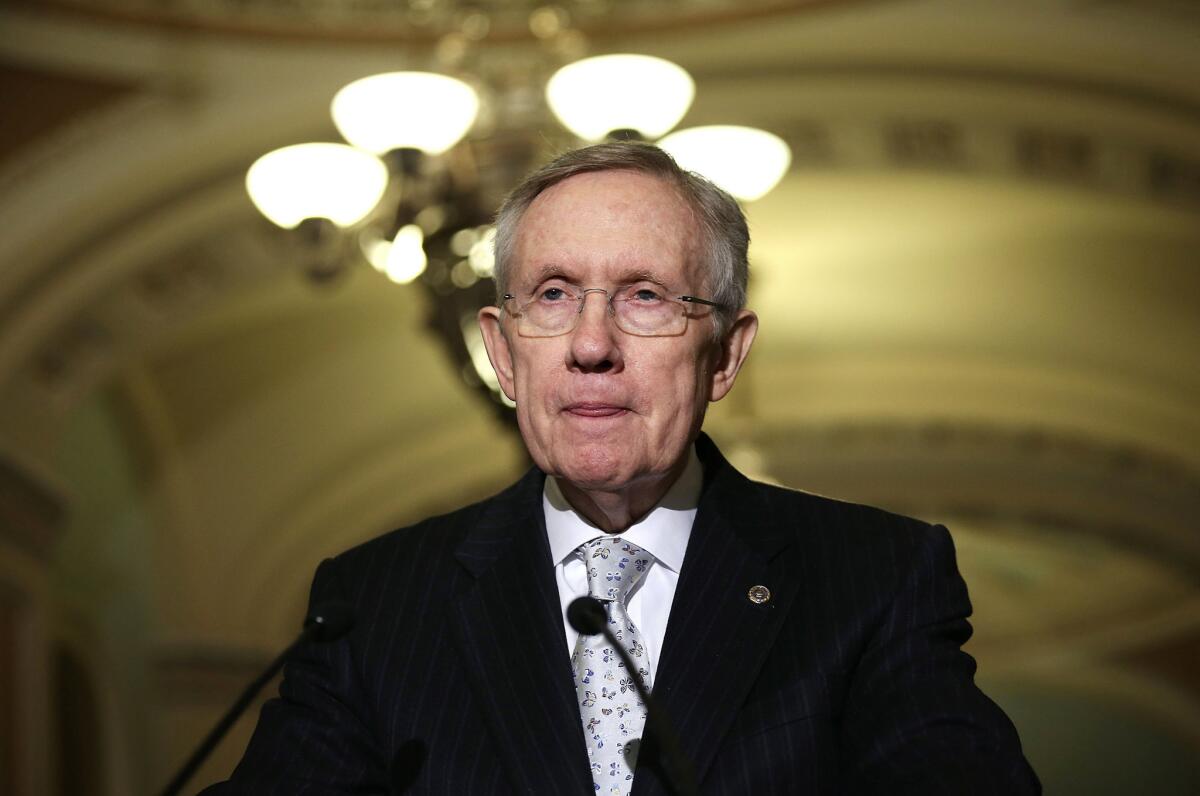To break D.C. logjam, Sen. Reid should revive the ‘nuclear option’

- Share via
As President Obama prepares to nominate three new judges for what is probably the nation’s most important federal appeals court, Republicans in the Senate are escalating their attempts to stand in his way.
Last month the Senate unanimously confirmed Deputy Solicitor General Sri Srinivasan for a seat on the U.S. Court of Appeals for the District of Columbia Circuit. But the appearances of harmony in that vote are deceiving. Srinivasan, who also served in the Justice Department in the George W. Bush administration, had bipartisan support and was seen as less ideological than some other Obama nominees.
Some Republicans who supported Srinivasan have essentially said, “This far and no further” when it comes to the D.C. Circuit, traditionally a steppingstone to the Supreme Court. Sen. Chuck Grassley (R-Iowa), the ranking Republican on the Senate Judiciary Committee, has accused Obama of trying to “pack” that court and has introduced legislation to abolish the three seats Obama plans to fill and reallocate two of them to supposedly busier regional appeals courts. The Grassley bill is co-sponsored by several senior Republicans.
The accusation that Obama seeks to “pack” the D.C. Circuit is a reference to President Franklin D. Roosevelt’s failed attempt in 1937 to reverse Supreme Court decisions unfavorable to the New Deal by expanding the number of seats on the court. But filling existing vacancies isn’t “packing” the court. If anyone is emulating FDR it’s Grassley: Like Roosevelt, he wants to manipulate the number of seats on a court as a way to shape its decision-making.
Of course Obama and his liberal supporters hope that the president’s appointments will nudge the D.C. Circuit in a direction favorable to the administration. President George W. Bush similarly was hoping for conservative decisions when he nominated judges to that court (and encountered Democratic obstruction even when the nominees weren’t extreme).
That’s what presidents do. As a general proposition, judges appointed by Democratic presidents render more liberal decisions than judges appointed by Republicans. But over time, a rough balance is achieved as judges are appointed by presidents of both parties. What’s more, studies have shown that appellate judges are influenced toward moderation by their colleagues. One study found a “dampening” effect on the views of Republican-appointed judges in environmental cases when they served on a panel with one or two Democrat-appointed judges.
The bottom line is this: There is only one president at a time, and that president’s judicial nominations deserve considerable deference from senators of both parties provided that a nominee is professionally well qualified and holds views that place him or her within a broad philosophical mainstream. As Sen. Lindsey Graham (R-S.C.) correctly observed when he voted for Sonia Sotomayor, one of Obama’s Supreme Court nominees: “Judge Sotomayor is definitely a more liberal judge than a Republican president would have nominated, but elections have consequences.” (Graham violated his own principle earlier this year when he joined in filibustering Caitlin Halligan, an Obama nominee opposed by the National Rifle Assn. Halligan has since withdrawn.)
If Obama nominates three qualified candidates for the remaining vacancies on the D.C. Circuit and Republicans filibuster or drag their feet, pressure will increase on Senate Majority Leader Harry Reid (D-Nev.) to revisit the issue of the “nuclear option.” That’s Washington-speak for a parliamentary maneuver in which, by majority vote, the Senate would determine that a filibuster of judicial nominations was unconstitutional. If that were to occur, a judge could be confirmed by a simple majority.
Senate Republicans flirted with the nuclear option during the Bush administration, but abandoned it when the so-called Gang of 14 senators reached an agreement that judicial nominees could be filibustered only in “extraordinary circumstances.” That understanding obviously has collapsed. If a similar arrangement is not worked out in this Congress, Reid should revive the nuclear option. Regardless of the party of the president, his nominees are entitled to expeditious up-and-down votes.
More to Read
A cure for the common opinion
Get thought-provoking perspectives with our weekly newsletter.
You may occasionally receive promotional content from the Los Angeles Times.










